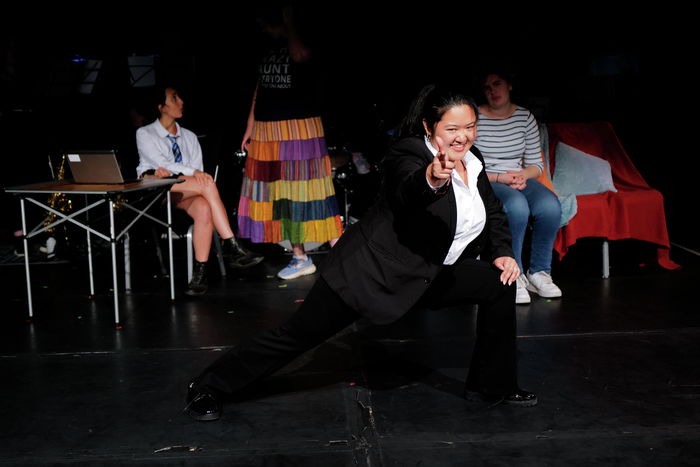The Chaplain is a lurid feast for the imagination
Stella Williamson commends this Camden Fringe musical for its talented cast and craftsmanship

Gabriel Owens’s The Chaplain starts before the audience have even taken their seats. Luke Muschialli, playing the eponymous character, sits centre stage astride a cello, discerning each audience member as they enter. He seems to be analysing the quality of our own souls.
The premise is (initially) simple. Muschialli’s chaplain, tasked with convincing prisoners in 19th-century Victorian England to repent for their sins before they are hanged, meets with three prisoners. Each performs their ‘solo’, providing insight into the circumstances of their imprisonment: Edie (Neela Nee) is a prostitute accused of killing a client, John Smith (Wilf Offord) awaits hanging for attempted murder and Jenny (Sanaer Madden) is a child forced to steal to survive. One by one, they exit the stage and are sent to their deaths.
“Haunting and bleak, it exposes the plight of Victorian England’s least fortunate”
The relentless and rambling “Opening” establishes Muschialli’s impressive vocals, and exemplifies both Owens’s clever lyricism and the score’s effective distinction between each character. Though numbers initially appear stylistically incongruous - the swinging “Livin’ Out There” jarringly bursts onto the stage after the beautifully earnest ballad “I Don’t Believe in God” (sung by Offord) - Owens’s use of different styles is highly effective. Such contrast allows for thorough character introductions, and the music - though often in danger of straying into generic musical theatre, with the occasional line leaving you to wonder what Les Mis melody it sounds like - speaks to a rising talent in its composer.
The nature of the plot means Muschialli takes on an enormous responsibility playing the Chaplain, as he greets, berates, sympathises with and ultimately abandons his sinners to their fate. Neela Nee is striking in her portrayal of Edie: deemed monstrous for murdering a customer, the well-paced number, “Music Hall” was wonderfully choreographed to depict Edie’s life story. A true masterclass in acting through song, I missed Nee’s strong vocals throughout the rest of the show. It was a genuine thrill to hear her voice ringing out so clearly once again in the show’s closing number.
“Owens, McLean and their cast can be proud”
Sanaer Madden, meanwhile, playing the final visitor, was absolutely chilling. Adults depicting children can often be poorly or even insensitively used in theatre so I truly commend the work of director Catherine McLean and Madden on such characterisation. Her tone of voice as well as the physical mannerisms she used while openingly weeping before the audience during her monologue and subsequent solo were wonderfully sickening. Although tasked with the show’s weakest song (the suitably simple “Lullaby”) she received, and deservedly so, the largest applause of the night.
Though indicative of Muschialli’s talents as an actor-musician, the cello accompaniment throughout the show became a tad trite, with cast members having to clunkily pass the cumbersome instrument back and forth to him. While it aided Owens’s score, I wonder if there exists a better way to incorporate its use. Perhaps for future runs the creative team could take inspiration from shows like We’ll Have Nun of It, where bass guitars and violins are actually integrated into the show as props - perhaps where there’s a cello, there’s a pulpit? Additionally, more emphasis could be placed on why the Chaplain is the only cast member to use an instrument - is it reflective of his power? His status? Or, following the show’s final twist, could it be used to represent his murder weapon?
Now onto that twist. The ‘Mysterious Woman’ (Lexie Graham), appearing only to the Chaplain, is revealed as the ghost of the infamous Molly O’Mally, a prostitute he murdered himself on account of her profession. The show ends with the Chaplain exposed as the ‘bogeyman’, the most recent killer to trawl the streets of England, indiscriminately murdering men, women and children in his attempt to cleanse his world of sinners. Though framed as the musical’s ‘big’ reveal, I feel this plot twist rather negates the social messaging promoted throughout the musical. The show appears to critique the legal and moral systems of Victorian England by excusing its sinners for their ‘crimes’ - Nee’s Edie killed in self-defence, John Smith was unable to murder the man abusing his girlfriend and Madden’s Jenny (a child!) stole food in order to save her desperate family. These characters act out of survival, reflecting the disparity between social classes rather than their own inherent sinfulness. Thus, I wonder if the musical’s revelation isn’t a little reductive and antithetical to its point. Since the Chaplain is already an executioner and undoubtedly wicked for enabling such a system, what does the show gain from making him an ‘actual’ murderer?
Though this revelation threatens to confuse and undermine the show’s social critique, The Chaplain is nonetheless grounded in its extremely talented cast and impressive score. Haunting and bleak, it exposes the plight of Victorian England’s least fortunate and the hypocrisy of religion. Owens, McLean and their cast can be proud.
‘The Chaplain’ played at the Lion & Unicorn Theatre, Camden from 13th-18th August at 6pm, and will return to Cambridge at the Corpus Playroom from 3rd-7th December, at 7pm.
 News / Eight Cambridge researchers awarded €17m in ERC research grants27 December 2025
News / Eight Cambridge researchers awarded €17m in ERC research grants27 December 2025 News / Clare Hall spent over £500k opposing busway 24 December 2025
News / Clare Hall spent over £500k opposing busway 24 December 2025 Comment / League tables do more harm than good26 December 2025
Comment / League tables do more harm than good26 December 2025 News / Caius mourns its tree-mendous loss23 December 2025
News / Caius mourns its tree-mendous loss23 December 2025 Comment / The ‘class’ of Cambridge24 December 2025
Comment / The ‘class’ of Cambridge24 December 2025










